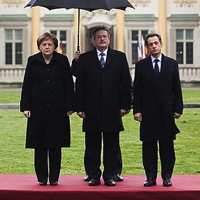At a time of serious budgetary restrictions and painful austerity measures, Europe must reassess its political ambitions and ratchet up its efforts to reverse negative trends in its global influence. With this in mind, Warsaw has increasingly sought to revitalize close coordination between Poland, France and Germany in what is known as the Weimar Triangle. That initiative has taken on greater urgency in anticipation of Poland assuming the rotating European Union presidency in July 2011. However, the most recent Weimar Triangle Summit, held in Poland in early February, confirmed that when it comes to Europe, Warsaw, Berlin and Paris have as many divergent priorities as convergent ones.
Security and defense policy is one of the Janus-like areas among the three states. On the one hand, regarding NATO, they hold different views about the future of American nuclear warheads in Europe, with Poland in favor of keeping them, Germany opposed, and France in possession of its own nuclear arsenal; as well as on the balance the alliance should strike between collective defense, favored by Poland, and expeditionary missions, supported by France and Germany -- the latter especially in the light of the anticipated reform of the Bundeswehr. On the other hand, the meeting confirmed that the Weimar Triangle states share the aim of strengthening the EU's Common Security and Defense Policy (CSDP), with both President Nicolas Sarkozy and Chancellor Angela Merkel explicitly declaring their readiness to support Poland in this effort.
The road map for progress has already been established: reform of the EU Battlegroup concept, more efficient civil-military crisis management, strengthening of cooperation between the EU and NATO -- especially between the European Defense Agency and Allied Command Transformation -- as well as the pooling and sharing of European defense capabilities. And in a December letter to EU foreign policy chief Catherine Ashton, the ministers of defense and foreign affairs of the Weimar Triangle states expressed impatience with the EU's perceived dithering. The letter called for bold decisions in order to make the CSDP more cost-effective and efficient, and made it clear that in the years to come, CSDP will remain the flagship of the trilateral cooperation.

